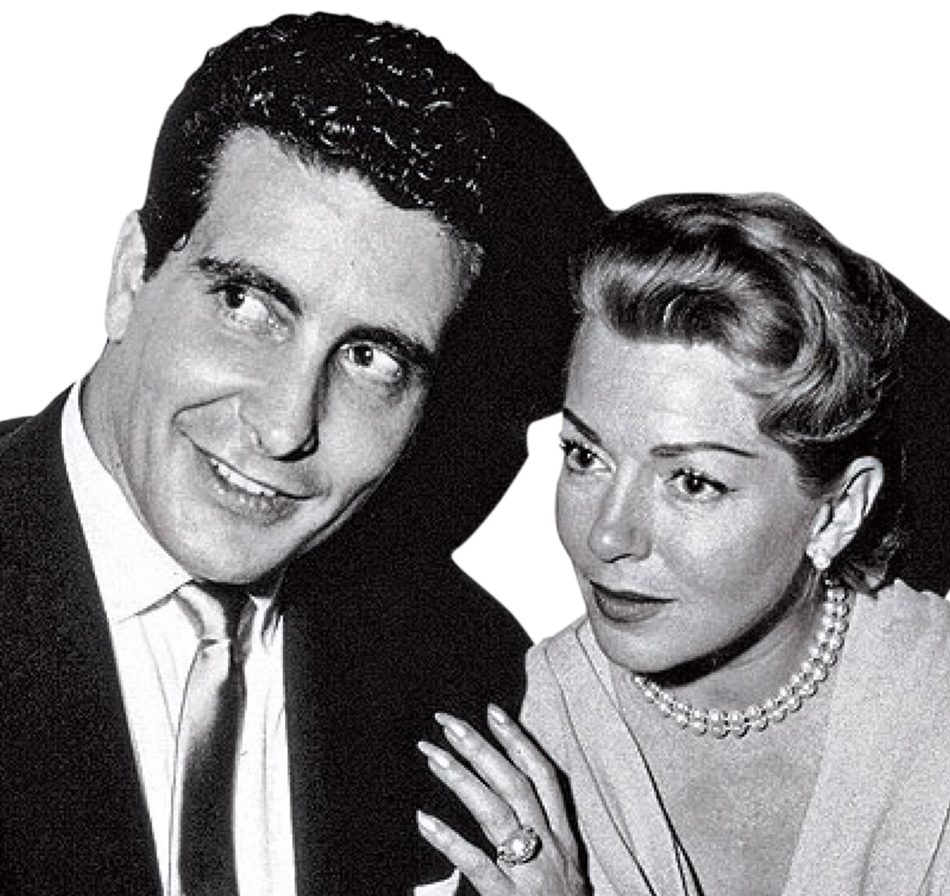
Lana Turner, one of Hollywood's greatest beauties and sex symbols – she was the original "sweater girl" – was discovered in 1936 by Hollywood Reporter Editor Billy Wilkerson after she skipped a high school typing class in favor of a coke at a soda fountain in Hollywood. Struck by her beauty and figure, Wilkerson gave Turner his card and introduced her to an agent who promptly got the attractive 15-year-old a part in an otherwise-forgettable low-budget film called They Won't Forget.
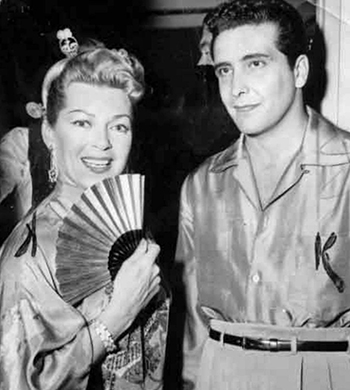
Hollywood soon beat a path to her door, and Lana became one of the most sought-after actresses in the industry. Men were similarly attracted to her, but the success Lana found as a Hollywood leading lady was not something she could duplicate in her personal life; she would be married seven times in all – none of her unions would last more than four years.
The relationship for which Lana is perhaps most remembered was not a marriage but an affair. It was both emotionally and physically violent – and it ended in a most unexpected and shocking way.
Lana met Johnny Stompanato during the spring of 1957, shortly after divorcing actor Lex Barker, her fourth husband. She fell for Stompanato's good looks and his prowess as a lover, but when she discovered his ties to gangster Mickey Cohen (Stompanato was his bodyguard and enforcer), she tried to break off the affair, fearing bad publicity. But Stompanato was not easily dissuaded, and over the following year, the two of them became entangled in a relationship marked by violent arguments, physical abuse and serial reconciliations.
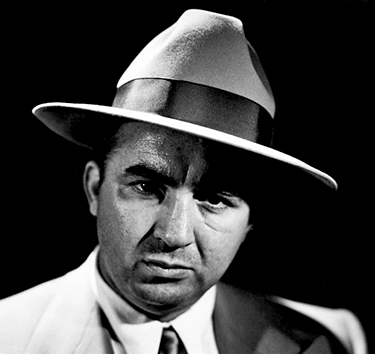
Stompanato had already lived a life of adventure. A Marine war veteran, he converted to Islam in order to marry a Turkish woman. After World War II he spent time in China and claimed he ran nightclubs, though in truth he was only a civil bureaucrat.
He was also a gigolo, being spotted frequently in public on the arms of beautiful, older women on whom he was financially dependent. He 'd been married at least twice before meeting Lana Turner, but nothing had ever lasted more than two years.
Neither Lana – nor her daughter Cheryl Crane (her daughter from her second marriage) – were enamored of Stompanato by the end, but in the beginning, when he was courting her, Lana found him very persuasive.
"I believed the lies a man told me, and by the time I learned they were lies it was too late," she would write years later. "He was utterly considerate, and I began to warm toward him physically. His wooing was gentle, persistent and finally persuasive."
Shortly after their relationship became public one of Lana's close friends told her that the man she knew as John Steele was actually mob affiliate John Stompanato. The warning was not enough for Lana to break it off.
"Call it forbidden fruit or whatever," she wrote. "This attraction was very deep, maybe something sick within me. And my dangerous captivation went far beyond lovemaking."
While in England filming Another Time, Another Place with Sean Connery, Lana hoped on the one hand that when she'd said goodbye to Johnny in Los Angeles, he would follow his previous pattern and move on to another woman. But on the other, Lana soon found herself lonely and reached out to him, asking Johnny to join her.
In England Johnny became physically violent with Lana for the first time. Bored and complaining bitterly about Lana's reluctance to be seen in public with him, an argument escalated to a shoving match.
"I reached for the phone, but he knocked it away and lunged for my throat," she wrote. "As his grip closed around my larynx, I managed to let out a loud scream, though I could feel the strain on my vocal cords."
Because he'd entered England illegally (using a passport with the alias John Steele), Lana was able to get him deported. But she would eventually have to return to the United States, where he would be waiting.

The 1958 Academy Awards marked a milestone in Lana's acting career – she'd been nominated for Best Actress for her performance in Peyton Place. But they also helped set off the final, fatal convulsion that spelled the end of Johnny Stompanato.
A photograph of Lana and Cheryl from that night at the awards dinner showed a spectacular Lana in a form-fitting strapless white lace gown. With her wide, bright eyes, flawless skin, charming smile and beautiful platinum blonde hair, Lana and daughter Cheryl – more modestly attired in a green taffeta gown – were the distilled essence of Hollywood glamour and royalty.
Watching the ceremony from his home in Beverly Hills, Stompanato grew angrier by the moment. When Lana returned home from a round of post-Oscar parties, he was in the grip of a violent rage.
"You'll never leave me home again!" he roared. "That's the last time."
After castigating Lana for not winning the Best Actress Oscar, and for her growing dependency on alcohol, he began slapping her face.
"He cracked me a second time, this time knocking me down. I staggered back against the chaise and slid to the floor," she wrote. "He yanked me up and began hitting me with his fists. I went flying across the room into the bar, sending glasses shattering on the floor."
Picking her up again, he grabbed her shoulders and peered down at her.
"Now do you understand?" he asked. "You will never leave me out of something like that again. Ever."
"Underlying everything was my shame," she wrote in her biography. "I was so ashamed. I didn't want anybody to know my predicament, how foolish I'd been, how I'd taken him at face value and been completely duped."
Lana lay bruised and bleeding in bed the day after the Academy Awards ceremony. Beside her lay a sleeping Johnny Stompanato – completely unaware of his approaching end.
Forever afterward Lana would speak of it only as "the happening". Cheryl would not speak of it at all.
It began on a Friday evening. Lana and Johnny were fighting and Lana would remember later she knew this fight would be a bad one. They were in her bedroom. Cheryl was in her room next door. Cheryl could easily hear everything that was being said.
After the Academy Awards, Cheryl had seen her mother's bruised face; there was no question John was beating her. Cheryl never saw – and never claimed she saw – Johnny hit Lana. But the after-effects – in London, and after the Oscars – were impossible to deny.
Outside the bedroom, Cheryl begged her mother and Johnny to stop.
"Cheryl, get away from that door!" Lana yelled back. "I'm not going to tell you again!"
Cheryl wasn't going anywhere. But her mother matched her stubbornness. "She wouldn't open the door," Cheryl recalled. "She said, 'Go back to your room. John is leaving.'"
Only he wasn't leaving. Instead he started making threats. He would cut Lana's face. He would kill Lana's mother. "And I'll get your daughter, too."
As the argument raged, Cheryl went to the kitchen and grabbed a carving knife. Johnny and Lana had actually bought it that same day. Cheryl went back upstairs and stood outside her mother's closed door.
The argument started to dissipate; Stompanato was leaving the house. He pulled a set of clothes and some heavy, wooden hangers out of the closet.
Still holding the knife, Cheryl pleaded with her mother to open the door, which an exhausted Lana finally did. Lana stood between Cheryl and Johnny. Johnny was facing the door and looking at Lana with a raised arm holding his clothes over his shoulder so that all Cheryl could see was the arm – and some kind of weapon.
As he moved past Lana toward the door, his arm upraised holding ... something ... Cheryl thrust her arm out. From Lana's point of view it looked only as though Cheryl had punched Johnny hard in the stomach.
"Oh, my God, Cheryl, what have you done," he gasped. Then he pirouetted and collapsed to the floor. His eyes closed and he wheezed horribly – mortally. Johnny Stompanato was dying on the carpet of Lana Turner's new home.
Cheryl dropped the knife and backed away. To her horror Lana realized now what had just happened. Cheryl had not punched John – she'd stabbed him. Lana went to Cheryl, who was sobbing, and helped her to her room. Then she returned to tend to the dying Stompanato.
He was unconscious by the time he hit the floor. His breathing was heavy. Lana took the knife and dropped it in the sink in the pink marble bar. Then she called her mother.
Within minutes a doctor and Lana's mother were there. Turner gave Johnny mouth-to-mouth resuscitation. The doctor gave Stompanato a shot of adrenaline directly into his heart. But it was too late. Johnny Stompanato, war hero, actor wannabe, two-bit hood, gigolo and abuser, was dead.
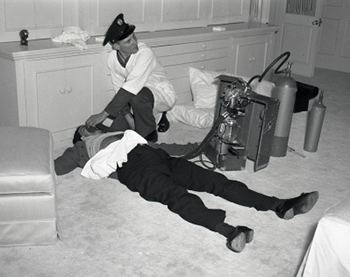
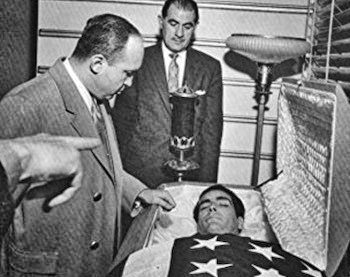
The coroner's inquest into the death of Johnny Stompanato was a white-hot television event, filling up the largest courtroom in the Beverly Hills Hall of Records. Three out of four seats in the court were reserved for the press. CBS and ABC broadcast the inquest live and it went out by radio as well.
Interest in the case was enormous. Box office receipts for Peyton Place, already quite healthy, increased by a third immediately after Johnny's death. By an amazing coincidence, one of Lana's key scenes in the movie was a courtroom interrogation in which she was questioned about crimes committed by her daughter.
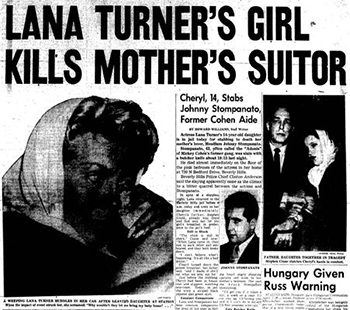
Lines formed for the relative handful of public seats at 6 a.m. Just before 9:00, under a merciless sun cruelly intensified by TV lights and flashbulbs, Lana, Stephan Crane and their lawyer Jerry Geisler entered the building and were hustled into the courtroom.
Because he was the person who had identified Stompanato's body at the morgue, mobster Mickey Cohen was the first person called to testify. An inveterate showman, he made waves in court by refusing "to identify the body on the grounds I may be accused of this murder." After only two minutes on the stand he was excused and left the building.
The coroner produced an autopsy report showing that not even "a whole team of doctors" could have saved Johnny's life from the wound inflicted by Cheryl Crane. He had been stabbed a single time in the abdomen. After slicing Stompanato's kidney, the carving knife had struck a vertebra and twisted upward, puncturing his aorta. Even disregarding that mortal wound, the coroner believed that Johnny probably wouldn't have lived another 10 years because of his bad liver.
Now it was time for Lana.
For the first hour, she answered questions from the coroner, his deputy and Geisler while a 10-man, two-woman jury watched, riveted. She hardly made eye contact with her questioners, staring instead at the far end of the courtroom where the wall and ceiling met. Twice she broke down on the stand.
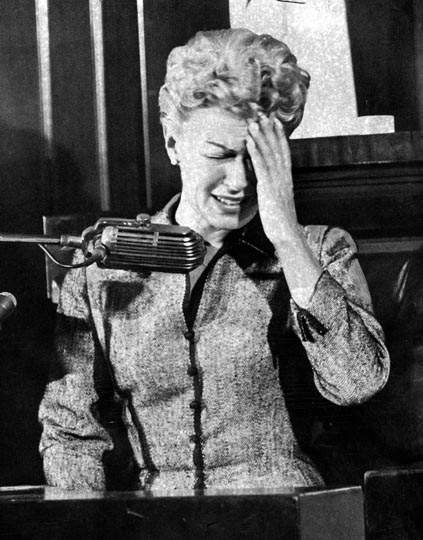
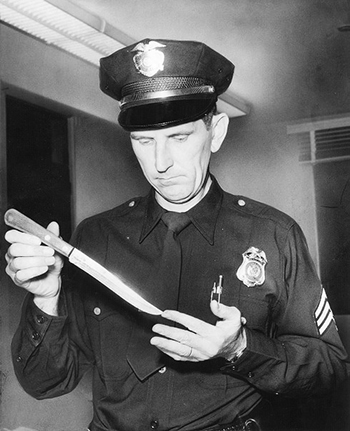
Speaking quietly, she explained as best she could why she stayed with a man who beat her. Under Geisler's gentle and considerate questioning she recalled a moment-by-moment account of the argument leading up to the stabbing.
When she finished, the coroner asked for a recess and the press instantly crowded around Lana, who was on the verge of fainting when Geisler maneuvered her away from the commotion. Reporters talked among themselves about her performance on the stand.

The jury deliberated less than a half-hour before deciding that John Stompanato's death was a case of justifiable homicide. Acting out of fear for her life and for that of her mother, they found that Cheryl Crane had been justified in using deadly force to stop Johnny. The decision was not unanimous, but it did not have to be.
Though the inquest verdict was not binding on the prosecution, the next day a decision was made not to pursue charges.
Among those outraged by the verdict was Mickey Cohen. "It's the first time in my life I've ever seen a dead man convicted of his own murder," he said colorfully. "So far as that jury's concerned, Johnny just walked too close to that knife."
Johnny Stompanato's family later brought a wrongful death lawsuit against Lana Turner. It was settled out of court.
